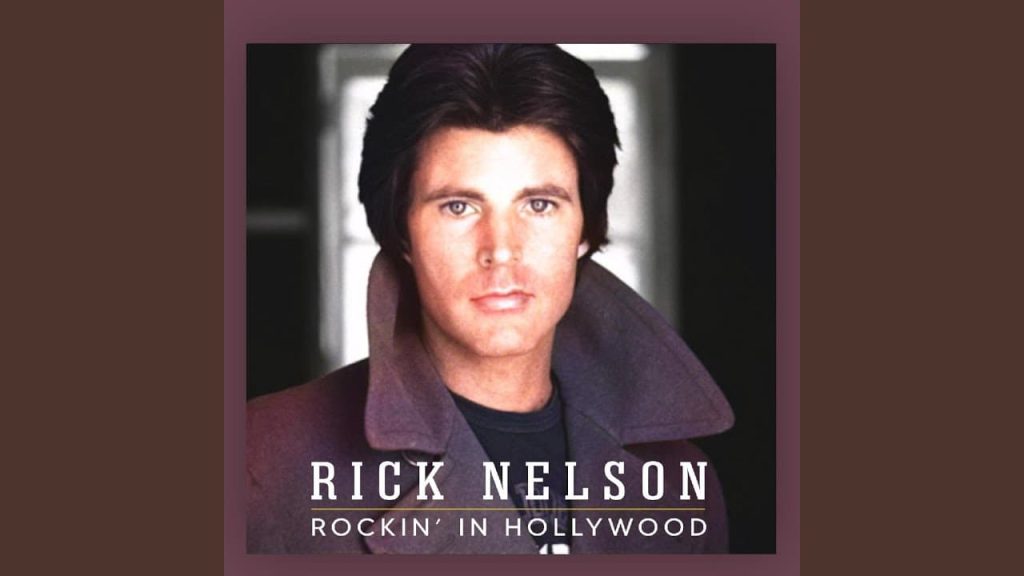
Ricky Nelson’s “Garden Party”: A Defiant Reflection on Fame and Self-Identity
Ricky Nelson‘s 1972 hit “Garden Party” stands as one of the most introspective and defining songs of his career. Coming from an artist who had spent his youth in the spotlight, the song offers a raw, unflinching reflection on the price of fame and the struggles of remaining true to oneself. By the early 1970s, Nelson—once a teen idol who rose to fame through his music and appearances on The Adventures of Ozzie and Harriet—was grappling with an evolving music scene and an audience that was not always open to his newer material.
“Garden Party” was inspired by a real-life event that took place on October 15, 1971, at Madison Square Garden. Nelson was part of a star-studded oldies concert, where he expected to perform a mix of his classic hits and some of his newer, more country-influenced material. However, when he played some of his newer songs, the audience—primarily there for nostalgic performances of his 1950s rock ‘n’ roll hits—reacted negatively, even booing him at one point. Feeling disillusioned, Nelson left the stage and soon after wrote “Garden Party” as a response to the event.
The song became an anthem of personal integrity and self-expression. With its laid-back, country-rock feel, “Garden Party” addressed the conflict between giving the audience what they expect and staying true to one’s artistic evolution. The famous chorus—“But it’s all right now, I’ve learned my lesson well / You see, you can’t please everyone, so you’ve got to please yourself”—speaks to the wisdom Nelson gained from the experience, understanding that an artist’s growth sometimes alienates certain fans but is necessary for personal fulfillment.
Musically, “Garden Party” marked a shift in Nelson‘s sound, leaning heavily into the country-rock genre that had gained popularity in the late 1960s and early 1970s. The song’s blend of acoustic guitars, a steady rhythm, and soft harmonies lent it a relaxed but purposeful vibe. It also reflected the influence of the Southern California music scene, which artists like The Eagles and Poco were helping to define around that time.
Lyrically, the song is full of veiled references to Nelson’s experience at Madison Square Garden and his relationship with the music industry and fellow performers. In the second verse, he sings about arriving at the concert dressed in a different style than what the audience expected: “Someone opened up a closet door and out stepped Johnny B. Goode.” This line references Chuck Berry, a foundational rock and roll figure who performed at the same concert, and possibly how Nelson felt out of place with his newer sound in a setting focused on rock nostalgia.
“Garden Party” also includes allusions to other figures in the music world. The line “Yoko brought her walrus” is often interpreted as a nod to John Lennon and Yoko Ono, who were present at the concert. Meanwhile, Nelson includes himself in the narrative, referring to his early hits: “If memories were all I sang, I’d rather drive a truck.” This is a powerful declaration of his artistic integrity—while Nelson could have continued relying solely on his early hits, he preferred to evolve, even if it meant leaving behind a part of his fanbase.
Despite the personal turmoil that led to the song’s creation, “Garden Party” became a commercial success, reaching No. 6 on the Billboard Hot 100 and becoming Nelson’s last Top 10 hit. It was also a hit on the country charts, signaling his successful transition from pop idol to country-rock singer. In many ways, the song was a reaffirmation of Nelson‘s relevance in the changing musical landscape, showing that he could still connect with audiences on his own terms.
“Garden Party” has since taken on a life of its own as a song about self-acceptance, resilience, and the complexities of public life. For Ricky Nelson, it was a cathartic expression of the disillusionment he felt with the entertainment industry, but it also served as a testament to his determination to stay true to himself as an artist.
In the broader context of Nelson‘s career, the song represents a turning point. While his popularity had waned since the height of his fame in the 1950s and early 1960s, “Garden Party” proved that Nelson was capable of producing meaningful, mature work that resonated with audiences. The song’s success also helped to cement his place as a respected figure in the burgeoning country-rock scene.
In conclusion, “Garden Party” is more than just a song about a disappointing concert experience; it’s an anthem for anyone who has ever had to balance the expectations of others with their own need for personal growth. With its gentle yet pointed lyrics, the song stands as one of Ricky Nelson‘s most enduring works, offering a timeless message about the importance of staying true to oneself, even in the face of criticism.